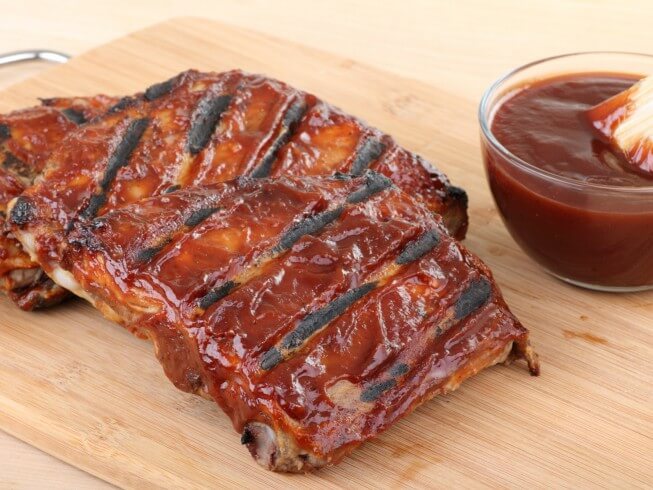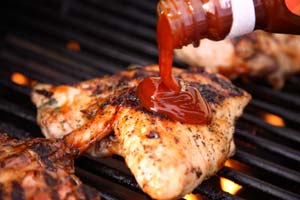This Italian cheese is so versatile that it can be used in both sweet and savory recipes from cheesecakes to lasagnas.

Simmered vinegar, sugar, and spices come together in this simple barbecue sauce, bringing a Carolina twist to your grilling routine.

1 1/2 cup cider vinegar
1/3 cup firmly packed brown sugar
1/4 cup ketchup
1 tablespoon hot sauce
1 teaspoon browning and seasoning sauce
1/2 teaspoon salt
1/2 teaspoon onion powder
1/2 teaspoon black pepper
1/2 teaspoon Worcestershire sauce
Combine all the ingredients in a saucepan over medium heat. Cook, stirring constantly, for 7-10 minutes or until the sugar and spices are dissolved.
Remove the pan from the heat and let cool to room temperature.
Place the cooled sauce in a covered container and chill in the refrigerator until ready to serve.
For a smokier flavor, add a few drops of liquid smoke to the sauce during cooking.
Serve the sauce warmed up slightly for better flavor when using it as a dipping sauce.
Experiment with adding additional spices, such as smoked paprika or garlic powder.
Adjust the sweetness by adding more brown sugar or a touch of honey if desired.
If you like a thicker sauce, let it cook a bit longer to reduce and concentrate flavors.
Combine it with other condiments like mayonnaise or sour cream for a creamy barbecue dip.
Use this sauce as a salad dressing by mixing it with olive oil for a tangy dressing.
Always taste and adjust the seasoning after cooking, as flavors can change when the sauce cools.
Try using this sauce as a glaze for roasted vegetables for a flavorful side dish.
West Carolina Cider Vinegar Barbecue Sauce is a tangy and slightly sweet barbecue sauce primarily made with cider vinegar, brown sugar, and other seasonings, making it distinct from tomato-based sauces often found in other regions.
Cider vinegar provides the signature tangy flavor and acidity that balances the sweetness of the brown sugar. While cider vinegar is traditional, you can experiment with other types of vinegar like white wine vinegar or red wine vinegar, but keep in mind that the flavor will be different.
You can use white sugar or coconut sugar as substitutes, but brown sugar adds moisture and flavor due to its molasses content.
Ketchup adds sweetness, thickness, and depth. If you prefer to avoid it, you can replace it with a bit of tomato paste mixed with sugar and water for consistency.
Any hot sauce you enjoy will work, but opt for a vinegar-based sauce for the best flavor match, as it complements the vinegar in the barbecue sauce.
Store the sauce in an airtight container in the refrigerator; it can last for up to two weeks.
You can freeze the sauce. Place it in freezer-safe containers, leaving space for expansion, and it should keep well for up to three months.
You can increase the amount of hot sauce or add crushed red pepper flakes or cayenne pepper for added heat.
This sauce is traditionally paired with pork, especially pulled pork, but it also complements chicken, ribs, and even grilled vegetables.
You can use it as a marinade, baste it on meats during cooking, or serve it as a condiment on the side.
You can substitute it with soy sauce for umami flavor, or use a combination of soy sauce and a touch of molasses for a deeper color and flavor.
Making the sauce ahead of time allows the flavors to deepen and meld, making it even tastier when served.
Saucepan: For combining the ingredients and heating them over medium heat to dissolve the sugar and spices.
Measuring Cups and Spoons: For measuring ingredients, including cider vinegar, brown sugar, ketchup, and various seasonings.
Wooden Spoon or Heat-Resistant Spatula: Used for stirring the ingredients in the saucepan.
Cooling Rack (optional): If desired, the sauce can be placed on a cooling rack to cool to room temperature more quickly before transferring to a container.
Covered Container: For storing the cooled barbecue sauce in the refrigerator. A glass jar or airtight container works best.
Pulled Pork: Use the sauce to coat tender pulled pork for a classic barbecue dish. The acidity of the vinegar cuts through the richness of the meat.
Grilled Chicken: Brush the sauce onto grilled or smoked chicken before serving. The tangy notes balance the smokiness of the chicken.
Ribs: Slather the sauce on pork or beef ribs, finishing them on the grill for a caramelized glaze. The vinegar helps tenderize the meat while adding a sharp flavor.
Brisket: Serve the sauce on the side with slices of smoked brisket. Its acidity helps brighten the deep, rich flavors of the beef.
Vegetable Grill: Toss grilled vegetables in the sauce for a zesty finish. The vinegar adds brightness and brings out the natural sweetness of the veggies.
Dipping Sauce: Use as a dipping sauce for fried foods like chicken tenders or wings. The tangy flavor provides a refreshing contrast to the crispy exterior.
Marinade: Use the sauce as a marinade for meats before grilling. The vinegar tenderizes proteins while infusing them with flavor.
Coleslaw: Mix some of the sauce into coleslaw for a tangy dressing. The vinegar complements the crunch of the cabbage and adds a refreshing element.
This Italian cheese is so versatile that it can be used in both sweet and savory recipes from cheesecakes to lasagnas.
Make your mornings a little less hectic with these overnight breakfast recipes. Prep the night before and enjoy a warm, comforting meal in the morning.
The name, vodka, comes from the Russian phrase zhiznennaia voda, or "water of life". It can be made from everything from potatoes to beets. It's considered to be fairly flavorless which makes it a great liquor for mixed drinks.

Online since 1995, CDKitchen has grown into a large collection of delicious recipes created by home cooks and professional chefs from around the world. We are all about tasty treats, good eats, and fun food. Join our community of 200K+ members - browse for a recipe, submit your own, add a review, or upload a recipe photo.

reviews & comments